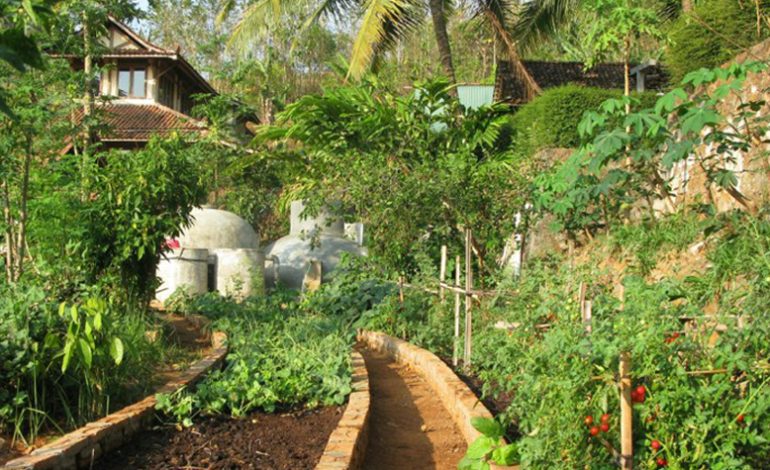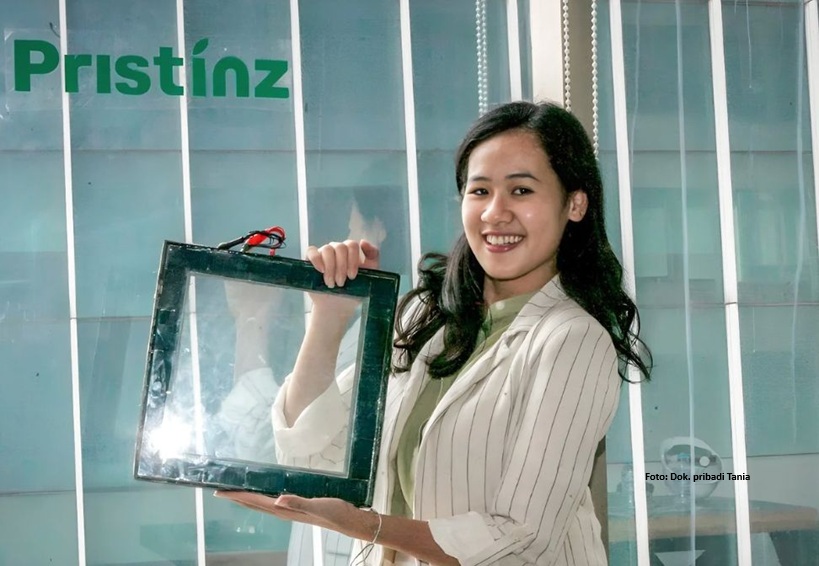Healthy and Sustainable: A Visit to Bumilangit Farm

I had a very good job; it was constantly busy and sometimes we worked long hours. I loved it, but one day, I reached a point where I realized I could not stay.
I quit but I had no idea what I wanted to do. During those months of R&R, I took cooking and baking class, traveling by bus, train or budget flights to places I had never been.
One of those was my trip to Bumilangit (Earth and Sky) farm organised by Slowfood Indonesia, the organisation that promote and preserve the wealth food biodiversity. The trip was to celebrate Terra Madre Day, a worldwide celebration of local food and sustainable food production held every year on December 10.
The farm, about a 30-minute drive from Yogyakarta, opens its doors to visitors and provides training for permaculture, organic farming and healthy food. Iskandar Waworuntu and his wife Darmilla started the 2.5-hectare permaculture farm eight years ago in the mountainous Imogiri area, a land considered unfit for agriculture due to the steep gradient and rocky soil.
Permaculture, an abbreviation of permanent culture, is a permanent cycle of environmentally friendly agriculture. Waworuntu grows everything from passion fruit, papaya, pineapple, berries, chilli, and herbs to wheat at an altitude of more than 280 meters. Banana trees space in basil to follow the philosophy self-sustaining agriculture that uses symbiotic relationships between plants.

Solar panels are installed to provide power; wastewater are filtered and cleaned so it can be used in the gardens. Waworuntu put wastewater garden next to a biogas tank. Not far from the garden there were ducks in a little pond filled by the filtered water. Cows and goats live in the same enclosure.
This was an excellent place to see practical permaculture in action. Waworuntu says he runs his organic farm on permaculture principles of restoring soil, conserving water, redirecting the waste stream, and he talks about his passion for healthy food.
During the talk, we sample the warm, red, gingery tea. In the wooden table the family served steam cassava and peanut, banana cake, sweet potato bread, sourdough bread, tiwul (traditional cassava snack), several jars of jam from peanut butter, mango, passion fruit and pineapple, mulberry and strawberry. All ingredients came from the farm.
Everybody was so friendly, their two sons in their 20s also shared their knowledge of permaculture. The sons run the family’s permaculture farm in Ubud, Bali. Waworuntu said his youngest child, four year-old Sofia was never fed formula milk. Since she was one-year-old, she has been consuming kefir milk, he said.
After the tour, we had tempeh workshop, the traditional Indonesian food made of soybeans. An old lady taught us how to make various types of tempeh from local soybean. Most importantly they were GMO free.
Before we said goodbye, Darmilla gave me ‘Scoby’ or Kombucha mother, bacteria yeast for kombucha tea. I still make my own kombucha from that scoby and drink it every morning.
The next day we went to Boyolali, behind Mount Merapi to visit Meneer Cheese, an Indonesian artisanal cheese producer. It produced good quality of Gouda from healthy Friesian Holstein cows. Meneer cheese empowers local farmers by teaching them to breed the cattle and to produce best quality grass for the cows. There, we witnessed the process of making gouda cheese. Then we tested it.

To me, the tour was an eye-opener about how humans can live with the environment in a less destructive way. I have learned these three things from the trip:
1. Permaculture should be practiced at home. In my small yard I have started to grow some green tomatoes, eggplant, turmeric, passion fruit, pomegranate, red and green chillies. Maintaining them is also good for my health I don’t need to go to the gym which I pay for.
2. We should support our local food economy by supporting local small-scale farmers. I live near a kampong, where an old native Jakartan couple grow exotic fruits like banana, papaya, jackfruit and guava in their backyard. I have become a regular customer. They come to my house with whatever they have. The best thing: the fruits are better than in the supermarket.
3. Growing your own fruits and vegetables and eating in season are the best way to enjoy fresh produce.
I hope to own big farm, like Waworuntu’s, one day, and in my own small space, I have started it.
About Lenita Sulthani
A former journalist with nearly two decades of experience, Lenita decided to let go of the profession she loves due to exhaustion from working long hours. She now tries her hands on entrepreneurship while baking and growing produce in the backyard.






















